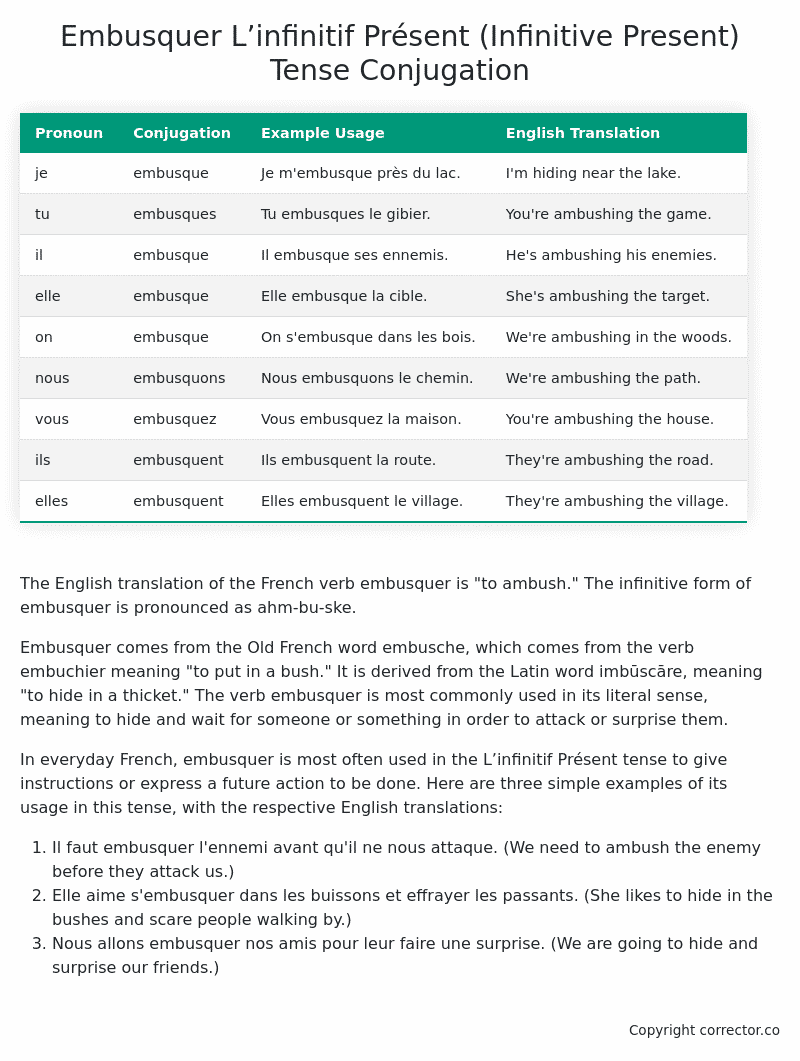L’infinitif Présent (Infinitive Present) Tense Conjugation of the French Verb embusquer
Introduction to the verb embusquer
The English translation of the French verb embusquer is “to ambush.” The infinitive form of embusquer is pronounced as ahm-bu-ske.
Embusquer comes from the Old French word embusche, which comes from the verb embuchier meaning “to put in a bush.” It is derived from the Latin word imbūscāre, meaning “to hide in a thicket.” The verb embusquer is most commonly used in its literal sense, meaning to hide and wait for someone or something in order to attack or surprise them.
In everyday French, embusquer is most often used in the L’infinitif Présent tense to give instructions or express a future action to be done. Here are three simple examples of its usage in this tense, with the respective English translations:
- Il faut embusquer l’ennemi avant qu’il ne nous attaque. (We need to ambush the enemy before they attack us.)
- Elle aime s’embusquer dans les buissons et effrayer les passants. (She likes to hide in the bushes and scare people walking by.)
- Nous allons embusquer nos amis pour leur faire une surprise. (We are going to hide and surprise our friends.)
Table of the L’infinitif Présent (Infinitive Present) Tense Conjugation of embusquer
| Pronoun | Conjugation | Example Usage | English Translation |
|---|---|---|---|
| je | embusque | Je m’embusque près du lac. | I’m hiding near the lake. |
| tu | embusques | Tu embusques le gibier. | You’re ambushing the game. |
| il | embusque | Il embusque ses ennemis. | He’s ambushing his enemies. |
| elle | embusque | Elle embusque la cible. | She’s ambushing the target. |
| on | embusque | On s’embusque dans les bois. | We’re ambushing in the woods. |
| nous | embusquons | Nous embusquons le chemin. | We’re ambushing the path. |
| vous | embusquez | Vous embusquez la maison. | You’re ambushing the house. |
| ils | embusquent | Ils embusquent la route. | They’re ambushing the road. |
| elles | embusquent | Elles embusquent le village. | They’re ambushing the village. |
Other Conjugations for Embusquer.
Le Present (Present Tense) Conjugation of the French Verb embusquer
Imparfait (Imperfect) Tense Conjugation of the French Verb embusquer
Passé Simple (Simple Past) Tense Conjugation of the French Verb embusquer
Passé Composé (Present Perfect) Tense Conjugation of the French Verb embusquer
Futur Simple (Simple Future) Tense Conjugation of the French Verb embusquer
Futur Proche (Near Future) Tense Conjugation of the French Verb embusquer
Plus-que-parfait (Pluperfect) Tense Conjugation of the French Verb embusquer
Passé Antérieur (Past Anterior) Tense Conjugation of the French Verb embusquer
Futur Antérieur (Future Anterior) Tense Conjugation of the French Verb embusquer
Subjonctif Présent (Subjunctive Present) Tense Conjugation of the French Verb embusquer
Subjonctif Passé (Subjunctive Past) Tense Conjugation of the French Verb embusquer
Subjonctif Imparfait (Subjunctive Imperfect) Tense Conjugation of the French Verb embusquer
Subjonctif Plus-que-parfait (Subjunctive Pluperfect) Tense Conjugation of the French Verb embusquer
Conditionnel Présent (Conditional Present) Tense Conjugation of the French Verb embusquer
Conditionnel Passé (Conditional Past) Tense Conjugation of the French Verb embusquer
L’impératif Présent (Imperative Present) Tense Conjugation of the French Verb embusquer
L’infinitif Présent (Infinitive Present) Tense Conjugation of the French Verb embusquer (this article)
Struggling with French verbs or the language in general? Why not use our free French Grammar Checker – no registration required!
Get a FREE Download Study Sheet of this Conjugation 🔥
Simply right click the image below, click “save image” and get your free reference for the embusquer L’infinitif Présent tense conjugation!

Embusquer – About the French L’infinitif Présent (Infinitive Present) Tense
Forming the Infinitive Present
Common Everyday Usage Patterns
As a Verb’s Dictionary Form
After Modal Verbs
As an Imperative
In Infinitive Clauses
Interactions with Other Tenses
Present Tense
Future Tense
Conditional Tense
Passé Composé
Imperfect Tense
Subjunctive and Conditional Moods
Summary
Want More?
I hope you enjoyed this article on the verb embusquer. Still in a learning mood? Check out another TOTALLY random French verb conjugation!


